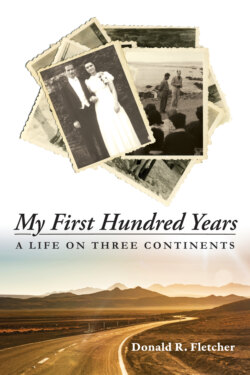Читать книгу My First Hundred Years - Donald R. Fletcher - Страница 8
На сайте Литреса книга снята с продажи.
Preface
ОглавлениеThere it was again, that poignant, haunting melody, as my classical music program was signing off. I found out later that the melody was Fauré’s Pavane. For now, it moved among the shadows, the low light of my hospital room in late evening. And it brought back once more, for no specific reason, that distinct, remembered scene.
I was in northern Chile, in some dusty town of what they call the Norte Chico (Little North). We had been riding south all day and into the night on the tawny, washboard ribbon of road across the desert pampa, several young Chileans, and I at the wheel. We needed lodging and a few hours of sleep. We spotted a two-story inn on the dark, unpaved street. The double leaves of a heavy wooden door were closed tight. As Fauré’s music swelled, I was seeing again how one of the young men struck a match and we tried to find how the door was barred, as our knocking and beating on it had brought no response.
That was all—the detached, remembered scene formed and faded each night, along with that poignant sign-off melody, in the shadows beyond my bed. Why that particular inn door, a fragment of a mostly forgotten journey? It wasn’t part of a memorable adventure, nor of some critical happening; just a single, isolated picture that the brain brought back in emotive detail, when that music infused my imagination.
Yes, my physical energy in the hospital was very low. I’d been through surgery for superficial bladder cancer; then the cancer was back, more invasively. With the help of my family, I’d consulted several options, settling on a radical, reconstructive procedure offered by a team at the Department of Urology of Rutgers University’s School of Medicine, and the Robert Wood Johnson Hospital in New Brunswick, New Jersey. It was a long surgery, some twelve hours, involving clearing out all possible organs that could be, or become, cancerous; then construction of a “neo-bladder” out of a segment of intestine, completely connected, to function almost normally as a urinary bladder. No need for an external pouch, to be tended to for the rest of my life.
The surgeons were hesitant, as Dr. Robert Weiss, the one with whom I continued to consult, later acknowledged. The oldest patient on whom they had performed their experimental operation was sixty-five, and I was eighty.
“But he’s in excellent health,” Dr. Weiss had affirmed; and so they agreed, with my concurrence, to go ahead.
The surgery was successful, and recovery seemed, at first, to be progressing well. But when it was time for me to begin to supplement the IV with soft nourishment by mouth, a tray came up to my room. I tried the food and vomited. Anything I attempted to swallow was thrown out violently.
Long days of observation followed. Each morning the house doctor, very pleasant, originally from India, came by on his rounds, trailed by a queue of students because this was a teaching hospital. Each day he questioned me, almost coaxingly. Had I at least passed a little gas. No, nothing. There was an intestinal blockage, and it was total.
The IV was my lifeline—my only lifeline. Strength began to ebb. The various tubes used to keep me drained were closely monitored. The IV could sustain life, but not strength, which was fading. My family was there, different members by turns. They needed to keep me moving, to get out of bed and walk, trailing my tubes, which were secured on a steel pole that I pushed along. But the effort was formidable.
My daughter Sylvia, especially, urged and insisted that I make it out of the room and down the corridor. When she let me stop and turn back, I saw the door to my room. It looked far away, at an impossible distance. How could I get to it? How could I finally just get on my bed again?
Dr. Weiss came to see me, almost four weeks after the surgery. The surgical team had concluded that another operation was necessary. Was I willing?
“Yes, yes. Let’s do it.” I was ready for some action, any action, to make progress.
That was how, in a late night of that second recuperation, my spirit turned hopeful again. There would be years, yet. And if I had the time, I would write.
It was a prayer to my God. I wasn’t asking for a bargain, a quid pro quo: do this for me, and I will do that for You. It was just that I began to feel that there were thoughts and ideas that I needed to put into words—books, even, that I needed to work at writing.
“If I can have fifteen years,” I thought “I’ll use them to write.”
That second surgery cleared the blockage. I was able to eat. Strength began to return, and after the expected two weeks—making mine a total of forty-four days in the hospital—I went home, carefully. I still trailed two of my tubes, and had a wide, deep incision that needed to be monitored and dressed by a visiting nurse, while it healed from the inside out.
But in time the first book took shape. I had begun it as a long narrative poem, an imaginative telling of how the beautiful New Testament Gospel of Luke came to be written. I recast it and rounded it out, in prose, giving it the title I, Lukas, Wrote the Book.
Now I have had, by God’s transcendent grace, not fifteen but twenty years of good health, and eight books have been published. This is my ninth.
